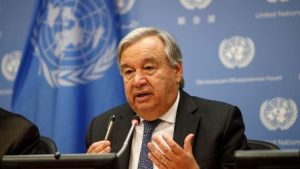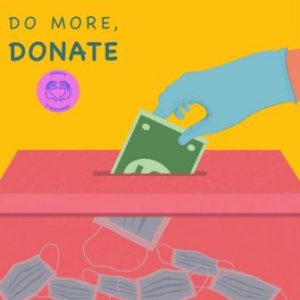Rebirthing Global Economy: UN Calls for Concrete, Radical Ideas and Action
If countries lack the financial means to fight the pandemic and invest in recovery, we face a health catastrophe and a painfully slow global recovery.
The COVID-19 pandemic, and the global recession it has triggered, are of course causing immense human suffering around the world. “Unless we act now, we could face years of depressed and disrupted economic growth. Those who suffer most will be the less equipped to respond. Extreme poverty and hunger are set to increase drastically, health‑care systems in many countries are already at breaking point and a generation of children is missing out on their education” said António Guterres, UN Secretary-General. He was addressing the round table on “Rebirthing the Global Economy to Deliver Sustainable Development: Insights from Women Leaders”, in New York on 1 July.
suffering around the world. “Unless we act now, we could face years of depressed and disrupted economic growth. Those who suffer most will be the less equipped to respond. Extreme poverty and hunger are set to increase drastically, health‑care systems in many countries are already at breaking point and a generation of children is missing out on their education” said António Guterres, UN Secretary-General. He was addressing the round table on “Rebirthing the Global Economy to Deliver Sustainable Development: Insights from Women Leaders”, in New York on 1 July.
The pandemic threatens not just to put the 2030 Agenda for Sustainable Development on hold, but to reverse progress that has already been made. And that is why, “since the beginning of the crisis, I have been calling for a rescue package amounting to at least 10 per cent of the global economy”, added Guterres.
It is interesting to see that developed countries are basically doing it with their own resources or printing money when their currencies can be accepted in all. However, the problem is to make sure that developing countries will have the resources, or will be provided with the resources, to be able to have similar packages to rescue their economies.
Representatives from different countries — about 50 Heads of State and Government — have now stepped forward to lead an effort that brings together governments, international financial institutions, UN agencies, private sector creditors and more. They are examining options to address the key challenges from global liquidity and debt vulnerability; to eroding illicit financial flows and recovering better.
“There is a need for concrete, radical and implementable solutions. Stimulating new ideas and a totally different debate in relation to the classic ones witnessed in the recent past are needed”, said Guterres.
Although COVID-19 is a human crisis, it also became a development and financing crisis – it is the first developing emergency. Developing countries face vastly increased demands for public spending exactly at the same time as tax and export revenues, inward investments and remittances are plummeting, said Guterres.
Also Read : Post-Pandemic Recovery: UN to Focus on Financial Architecture and Erasing Inequalities
Action on finance must be central as we craft a comprehensive global response. If countries lack the financial means to fight the pandemic and invest in recovery, we face a health catastrophe and a painfully slow global recovery.
Guterres shared that “We are on the cusp of a widespread debt crisis, with many countries faced with an impossible choice between servicing their debt or protecting their most vulnerable communities and fighting the pandemic. Debt defaults can have devastating social consequences. And many countries simply do not have access to financial markets to be able to service their debt”.
The “Group of 20” debt service suspension for the poorest countries was a welcome start, said Guterres. However, much more needs to be done. Support must be expanded and determined by vulnerability, rather than just gross domestic product (GDP). There is an absolute need to address the debt concerns of the – mostly – developing countries and a large number of middle-income countries that have lost the capacity to access financial markets.
Moreover, starting thinking about durable solutions on debt that will create fiscal space for investments in recovery and the Sustainable Development Goals (SDGS).
Beyond the fiscal shock, the COVID-19 crisis has impacted all the components of external finance: Direct  investment, exports and remittances. Official development assistance (ODA) is under pressure as developed countries themselves deal with the fallout of the crisis. Uncertainty and a further retreat to inward‑looking policies and protectionism could turn today’s sharp decline into a prolonged period of weak external financing.
investment, exports and remittances. Official development assistance (ODA) is under pressure as developed countries themselves deal with the fallout of the crisis. Uncertainty and a further retreat to inward‑looking policies and protectionism could turn today’s sharp decline into a prolonged period of weak external financing.
Moreover, as the pandemic disrupts supply chains and trade, there is a danger that some manufacturing will move back to developed countries, further reducing developing countries’ resources, and raising fundamental questions about their integration into the global economy. These questions need bold and creative answers.
Also Read : Land Rights as Human Rights: Asian CSOs Embark on Land Conflict Monitoring Initiative
Guterres said that “Some of the most prominent and innovative economists involved in reimagining our world today happen to be women. It is also striking that while just 10 per cent of global leaders are women, many of these leaders have launched decisive and effective responses to the pandemic”. Insights and perspectives of all are needed to create the inclusive, resilient and gender-equal societies to address the climate crisis and other global challenges.
(Slider Image credit: Tonik/Unsplash)
